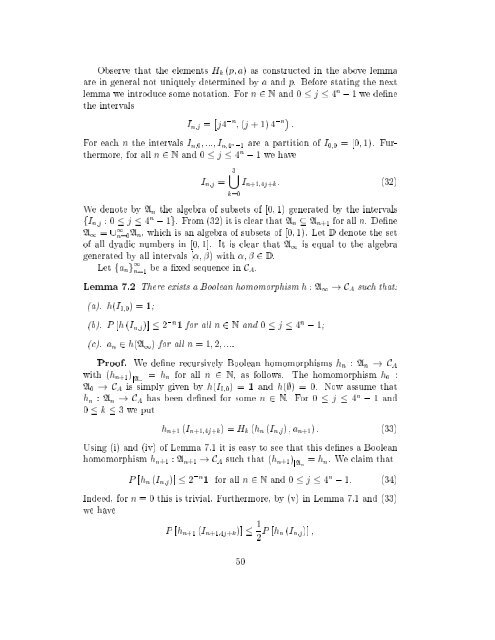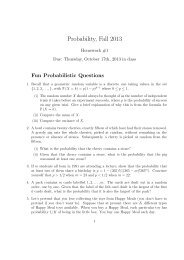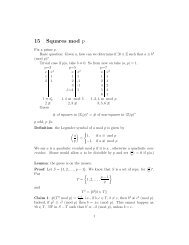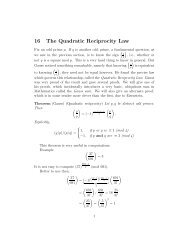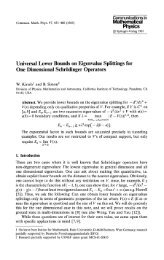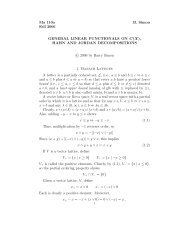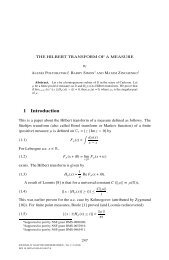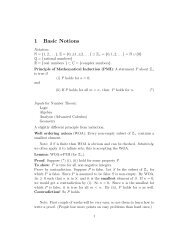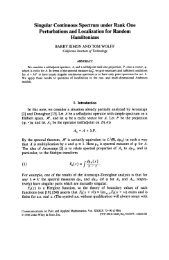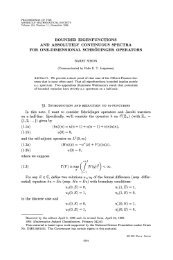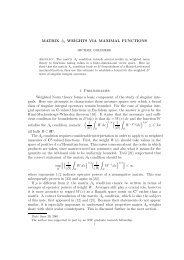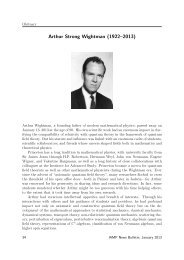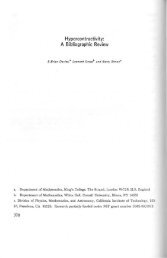Representations of positive projections 1 Introduction - Mathematics ...
Representations of positive projections 1 Introduction - Mathematics ...
Representations of positive projections 1 Introduction - Mathematics ...
Create successful ePaper yourself
Turn your PDF publications into a flip-book with our unique Google optimized e-Paper software.
Observe that the elements Hk (p a) as constructed in the above lemma<br />
are in general not uniquely determined by a and p. Before stating the next<br />
lemma we introduce some notation. For n 2 N and 0 j 4 n ; 1wede ne<br />
the intervals<br />
Inj = j4 ;n (j +1)4 ;n :<br />
For each n the intervals In0 ::: In4 n ;1 are a partition <strong>of</strong> I 00 = [0 1). Furthermore,<br />
for all n 2 N and 0 j 4 n ; 1 we have<br />
Inj =<br />
3[<br />
k=0<br />
In+14j+k: (32)<br />
We denote by An the algebra <strong>of</strong> subsets <strong>of</strong> [0 1) generated by the intervals<br />
fInj :0 j 4n ; 1g. From (32) it is clear that An An+1 for all n. De ne<br />
A1 = [ 1 n=0An, which is an algebra <strong>of</strong> subsets <strong>of</strong> [0 1). Let D denote the set<br />
<strong>of</strong> all dyadic numbers in [0 1]. It is clear that A1 is equal to the algebra<br />
generated by all intervals [ )with 2 D .<br />
Let fang 1<br />
be a n=1 xed sequence in CA.<br />
Lemma 7.2 There exists a Boolean homomorphism h : A1 !CA such that:<br />
(a). h(I 00) =1<br />
(b). P [h (Inj)] 2 ;n 1 for all n 2 N and 0 j 4 n ; 1<br />
(c). an 2 h(A1) for all n =1 2:::.<br />
Pro<strong>of</strong>. We de ne recursively Boolean homomorphisms hn : An ! CA<br />
with (hn+1) jAn = hn for all n 2 N, as follows. The homomorphism h 0 :<br />
A 0 ! CA is simply given by h(I 00) = 1 and h() = 0. Now assume that<br />
hn : An ! CA has been de ned for some n 2 N. For 0 j 4 n ; 1 and<br />
0 k 3we put<br />
hn+1 (In+14j+k) =Hk (hn (Inj) an+1) : (33)<br />
Using (i) and (iv) <strong>of</strong> Lemma 7.1 it is easy to see that this de nes aBoolean<br />
homomorphism hn+1 : An+1 !CA such that (hn+1) jAn = hn. We claim that<br />
P [hn (Inj)] 2 ;n 1 for all n 2 N and 0 j 4 n ; 1: (34)<br />
Indeed, for n = 0 this is trivial. Furthermore, by (v) in Lemma 7.1 and (33)<br />
we have<br />
P [hn+1 (In+14j+k)]<br />
50<br />
1<br />
2 P [hn (Inj)]


